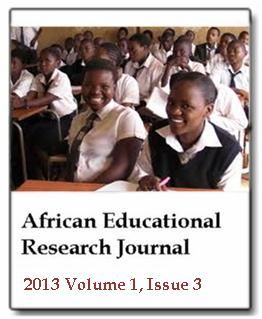Increasing female participation in advanced level mathematics: A perspective from students and teachers in Zimbabwe
Mandina S., Mashingaidze S. S. and Mafuta J.African Educational Research Journal
Published: November 8 2013
Volume 1, Issue 3
Pages 183-190
Abstract
The non-participation of girls in advanced mathematics has become a concern over a number of years. This study sought to find ways of increasing female participation in Mathematics at advanced level based on an understanding of the constraining factors to female participation in mathematics. The descriptive survey research design was adopted in this study in which questionnaires, interviews and observations were used as data collection instruments. Questionnaires were completed by ninety nine female students (sixty ‘O’ levels and thirty nine ‘A’ levels) and nine mathematics teachers. Interviews were conducted with three mathematics teachers, 10 ‘A’ level female students who were not taking mathematics and twenty ‘O’ level female students. Classroom observations were also conducted in six Mathematics lessons. Each lesson lasted for forty minutes. The results of the study have revealed the following factors as limiting female participation in mathematics: perceived difficulty of the subject, lack of self confidence, anxiety, negative teacher attitudes, negative stereotypes about girl’s math abilities, cultural belief that mathematics is a male domain and lack of knowledge about mathematics careers entail. The research findings also revealed that to promote female participation in advanced level mathematics, parents and teachers should: enhance girls’ confidence about their math abilities; create a conducive classroom climate that enhances interest and curiosity in mathematics; expose girls to female role models who have succeeded in mathematics and provide information advice and guidance on mathematics careers. The study recommends that gender and cultural biases attached to mathematics should be de-emphasized at home and school and that mathematics teachers should adopt some of the more recent reform-based instructional strategies that actively engage students while the Government should give incentives to girls who study mathematics at higher levels in order to encourage young females to pursue mathematical careers.
Keywords: Mathematics, female students, anxiety, gender stereotypes, career guidance.
Full Text PDF
